More than 2.1 billion people worldwide lack access to justice today. This fact shows a pressing need for new ways to offer legal help to those in greatest need. Virtual legal services and online dispute resolution (ODR) are emerging as key solutions. They promise a future where legal aid is both accessible and efficient.

Key Takeaways:
- Virtual legal services and online dispute resolution (ODR) are transforming the accessibility and efficiency of legal help.
- ODR provides a technology-driven approach to resolving disputes outside the traditional courtroom setting.
- The COVID-19 pandemic has accelerated the adoption of online legal proceedings and virtual trials.
- Clear definitions, standards, and accessibility are crucial in ensuring the effectiveness and inclusivity of ODR.
- Technological advancements, such as AI-powered litigation tools, are reshaping the legal landscape.
The Definition and Importance of Online Dispute Resolution (ODR)
Online Dispute Resolution (ODR) uses technology to solve conflicts outside court. It provides virtual mediation and arbitration. This makes resolving disputes more efficient and less expensive.
ODR has become more popular because it’s easier and cheaper to access legal help. Technology lets people avoid in-person meetings. It cuts down on travel costs and saves time for everyone. That’s why many folks and businesses prefer ODR to settle disputes.
“ODR is changing how we handle conflicts by offering a virtual place to talk, mediate, and arbitrate. The easy access and cost savings of ODR make it a great tool for justice for everyone.”
Virtual mediation services are key to ODR, allowing conversations and agreements online. These platforms let people communicate in real time, even from far away.
In the same way, virtual arbitration platforms let disputes be resolved by an unbiased decision-maker online. They provide a space to share evidence and hear decisions without meeting in person.
ODR is important because it combines traditional legal practices with modern tech. It has many benefits:
- Improved accessibility: ODR lets people from anywhere take part without traveling.
- Cost savings: Without physical hearings or much admin, ODR lowers dispute costs.
- Efficiency: Technology speeds up the sharing of information and communication.
- Flexibility: ODR gives more control over when disputes are resolved.
- Confidentiality: ODR platforms keep shared data private and secure.
As we rely more on tech, ODR will become key in law. It gives easy and affordable ways to solve disputes. This is changing how we deal with conflicts today.
The Need for Clear Definitions and Standards in ODR
To ensure quality in Online Dispute Resolution (ODR), clear definitions and standards are crucial. They help everyone understand ODR better. This aids in effective teamwork among stakeholders.
Standards act as guides, promoting fairness and transparency in ODR. They protect user rights by setting conduct expectations for mediators and participants.
ODR faces challenges with universal definitions due to its growth and variety. Developing comprehensive standards for different ODR methods is essential.
Clear definitions help users and practitioners navigate ODR effectively. This builds trust in online legal services, making ODR a preferred choice over traditional methods.
Virtual legal services are key in defining ODR standards. As technology evolves, online legal platforms are on the rise. They push for clear standards to integrate ODR into their services.
They aim for consistent ODR processes to offer reliable services. By working on definitions and standards, these providers support ODR’s development.
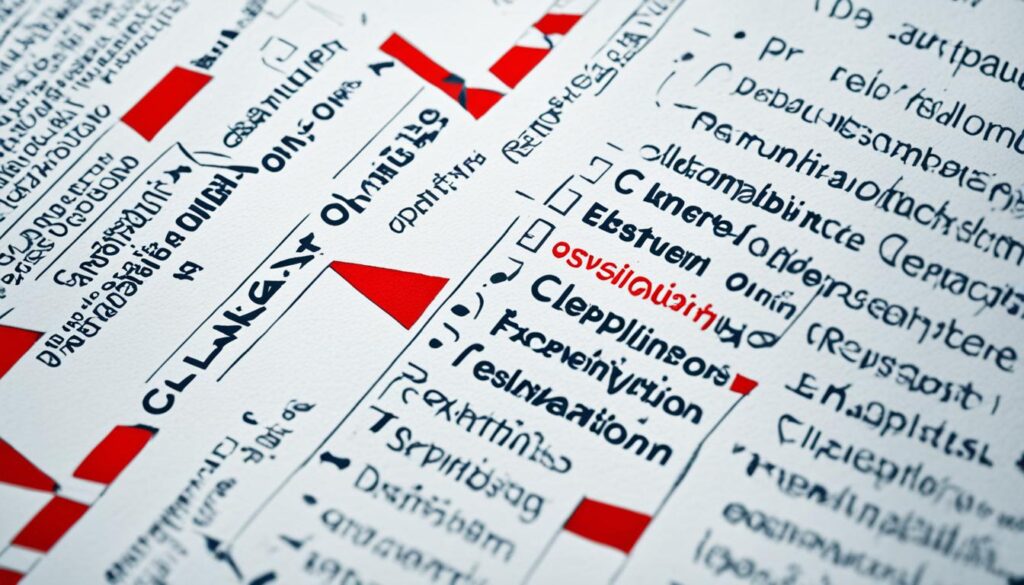
ODR’s clear standards ensure fairness and integrity in virtual legal services. These standards offer a framework for meaningful dispute resolution. By sticking to these standards, ODR platforms gain trust, paving the way for ODR’s success as a dispute resolution method.
Ensuring Accessibility in ODR for Persons with Disabilities and Vulnerable Populations
Accessibility is key in Online Dispute Resolution (ODR). It makes sure everyone, including those with disabilities, can use it. It’s important for ODR platforms to be open to all. Challenges exist for some groups in getting legal help. We need to overcome these obstacles.
Individuals with disabilities may face problems in regular legal situations. These issues could stop them from fully joining in resolving disputes. Similarly, those with little money or education might find legal matters hard. Understanding their rights can also be tough for them.
To improve access to ODR, we must use the Web Content Accessibility Guidelines (WCAG). This ensures ODR sites work well for people with disabilities. Features include screen readers, keyboard options, and video captions. With these, individuals with disabilities can take part in solving disputes better.
ODR sites also need to help people who might struggle with complex sites. This means easy-to-use interfaces and simple instructions. Removing hard words and legal speak is key. Then, more people can use ODR sites well and get the help they need.
Teaching about ODR’s benefits is also important. People with disabilities and those who might feel left out should know about it. By telling them what’s available, we give them the tools to solve their legal issues online.
When we design ODR platforms with everyone in mind, they can change how justice is accessed. For those with disabilities or who might be overlooked, ODR offers new ways to deal with legal problems. By removing old obstacles, ODR lets them take charge of resolving disputes.
Key Steps to Ensure Accessibility in ODR
| Steps | Description |
|---|---|
| Follow Web Content Accessibility Guidelines (WCAG) | Design platforms and processes that are compatible with assistive technologies, provide keyboard navigation options, and ensure captioning for video content. |
| Use user-friendly interfaces and clear instructions | Create intuitive and easy-to-use interfaces that are accessible to individuals with limited digital literacy. |
| Simplify language and remove legal jargon | Ensure that the language used in ODR platforms is easy to understand for individuals with limited legal knowledge. |
| Promote awareness and education | Inform and educate persons with disabilities and vulnerable populations about the benefits and availability of ODR. |
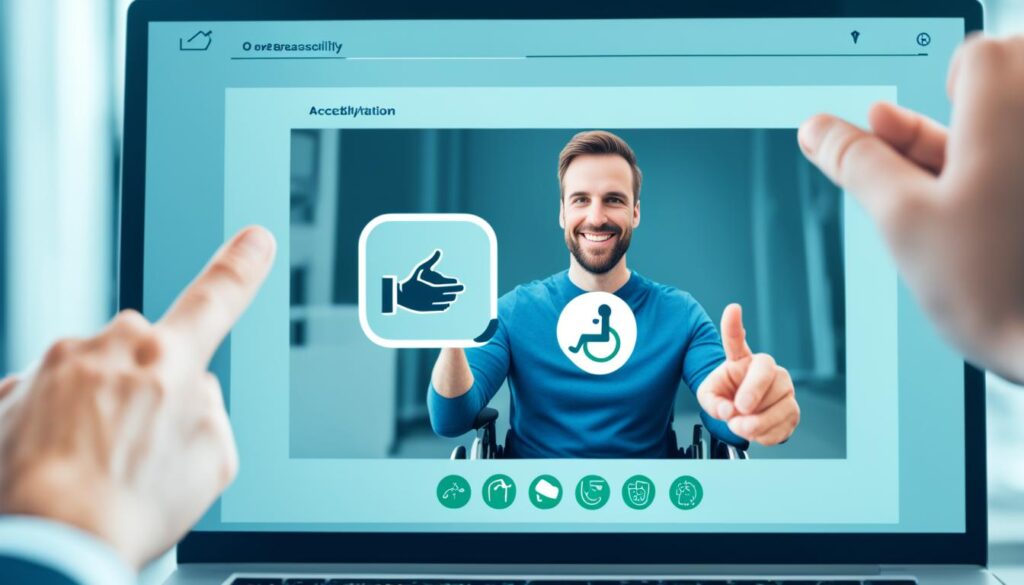
By taking these steps, ODR platforms can be welcoming for everyone. Making ODR accessible is about fairness and providing justice for all. This goes beyond just following the law. It shows a true dedication to equal justice for everyone.
The Evolution of Online Legal Proceedings and Virtual Trials
The COVID-19 pandemic changed many sectors, including law. Social distancing made in-person legal meetings tough. But, technology brought online legal proceedings and virtual trials as a solution.
Online legal proceedings mean legal processes done remotely. Virtual trials are court cases held online, without going to court. These methods have become popular and are here to stay.
Remote legal assistance is a big plus of online legal work. Lawyers and clients work together from anywhere. This makes the legal system more accessible and efficient. Lawyers can consult clients, negotiate, and argue cases online. This saves time and resources.
Technology in legal work has many benefits. It makes sharing documents and evidence easy. Virtual platforms let people meet face-to-face from different places. This helps lawyers continue their work smoothly without meeting in person.
Online legal work also solves many court problems. It cuts travel costs, security worries, and scheduling issues. It makes justice more accessible to those far away or with limitations.
Yet, moving legal work online has its challenges. Issues like tech setup, internet access, and data security need attention. Keeping legal work fair and secure needs constant effort and updates.
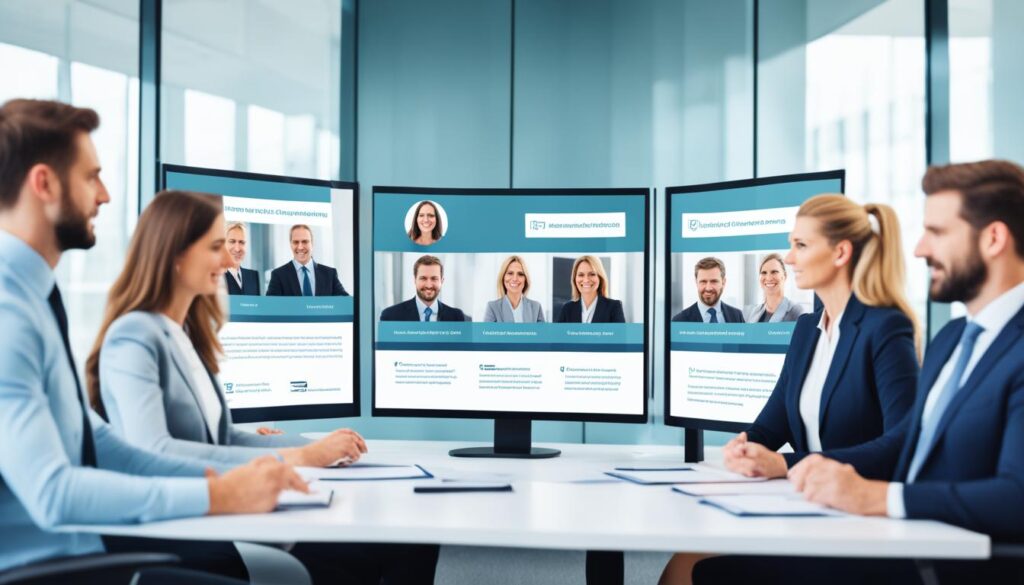
Enhancing Access and Efficiency
“The COVID-19 pandemic sped up the use of online legal methods, opening new doors for law. With remote legal assistance, lawyers can represent clients well without meeting in person. “
Online legal methods are changing how law works. These changes are a response to the pandemic. But they also show the future of law. With tech improving and problems being solved, online legal work could make the legal system more accessible and efficient.
Technological Advancements in Legal Tech and Civil Justice
New tech is changing the legal world, making things more efficient and accessible. We see a big change with online legal activities and the use of AI for law. These tools make civil justice smoother and easier to get.
Online legal activities have become more common, thanks to more remote work. Lawyers, judges, and clients can join hearings from anywhere. This means we don’t need physical courtrooms as much. It saves time, costs, and makes the legal system more efficient.
AI in law helps automate tasks like reviewing contracts and researching. By analyzing legal documents fast and accurately, AI tools save time. They also offer insights that might have been missed, making legal work easier.
“Virtual legal proceedings and AI-fueled litigation tools are reshaping the field of civil justice, offering new possibilities for efficiency and accessibility.” – Legal Tech Magazine
The Impact of Technological Advancements on Civil Justice
These tech advancements streamline legal processes. This makes resolving disputes faster and managing cases easier. By cutting out travel and paperwork, legal processes speed up, which helps reduce case backlogs.
AI tools improve the quality of legal work. They analyze data and find information that can be overlooked. This helps lawyers make better decisions and strengthens their cases. Improved case outcomes are the result.
These advancements make justice more reachable to more people. Those who were previously held back by distance, money, or other issues can now access legal help. This helps close the gap in the justice system, making it fairer for everyone.
The Legal and Policy Implications
Introducing these technologies raises questions about keeping digital data safe and private. We must protect sensitive information from hackers and unauthorized views.
The ethical use of AI in law is also important. As AI becomes more common, setting rules for its use is crucial. Legal professionals must use AI ethically, following their professional standards.
Finally, we need policies for the use of online legal activities and AI in law. These should cover evidence use and avoid AI bias. Clear policies will let us benefit from these technologies while protecting legal rights.
Technological advancements are changing the legal profession for the better. Yet, we must be mindful of ethical and legal issues to ensure these changes are positive and fair for everyone.
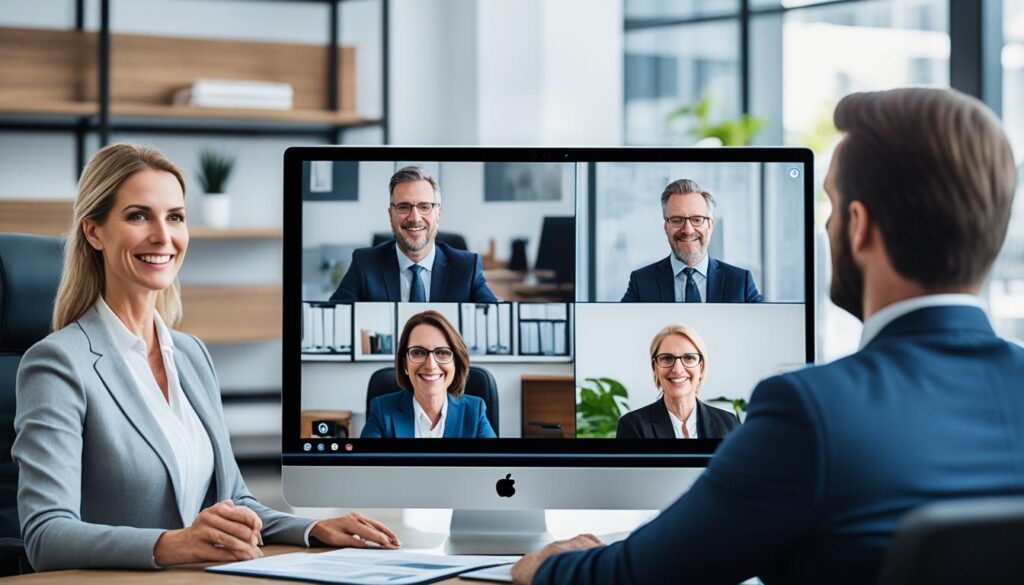
| Advantages | Challenges |
|---|---|
| Enhanced efficiency and cost savings | Data security and privacy concerns |
| Improved access to justice | Ethical considerations in AI use |
| Streamlined legal processes | Policy frameworks and regulations |
| Accurate and quick legal research | Potential bias in AI algorithms |
The Role of Lawyers in the Design and Implementation of ODR Programs
Lawyers are vital in setting up Online Dispute Resolution (ODR) programs. Their deep legal knowledge ensures fairness, transparency, and justice online. They shape ODRs to meet everyone’s needs effectively.
They understand the legal world and dispute resolution’s nuances well. Lawyers guide the creation of fair algorithms and processes. Working with them from the start makes ODR tools trusted and solid.
Lawyers ensure everyone’s rights are respected in ODRs. They keep important legal protections like the right to speak and have a lawyer. This keeps the process honest and builds trust in the results.
They also make ODRs fit specific legal needs and areas. This customization makes the outcomes legal, fast, and useful.
The emergence of virtual law firms and online help boosts lawyers’ roles in ODRs. These platforms offer legal aid far and wide, making it easier to get. It helps more people find affordable and handy legal help.
Benefits of involving lawyers in ODR programs:
- Ensuring fairness, transparency, and effective legal representation
- Upholding due process and protecting the rights of all parties
- Customizing ODR platforms to align with specific legal domains or jurisdictions
- Extending accessibility through virtual law firms and online legal support
ODR programs complement lawyers, not replace them. Involving lawyers in ODRs leverages their knowledge for strong and trustworthy platforms. This lets people confidently seek justice.
Lawyers are key in growing and improving ODRs. Their work makes sure these platforms stay true to legal standards. They safeguard everyone’s interest, leading to a fairer, open justice system.
| Benefits of involving lawyers in ODR programs | |
|---|---|
| Ensuring fairness, transparency, and effective legal representation | fairness, transparency, effective legal representation |
| Upholding due process and protecting the rights of all parties | due process, rights of all parties |
| Customizing ODR platforms to align with specific legal domains or jurisdictions | customizing ODR platforms, legal domains, jurisdictions |
| Extending accessibility through virtual law firms and online legal support | accessibility, virtual law firms, online legal support |

*Note: The table above summarizes how lawyers help with ODRs. They play a big role in making ODRs fair, putting in due process, making them fit for specific laws, and making legal help easier to access.*
Addressing the Access to Justice Crisis with Technology
The United States legal system is in crisis, with many unable to afford lawyers. This part will show how tech can help bridge this gap. It ensures everyone gets equal justice.
Enhancing Access with Legal Technology
Legal tech could change how legal services are provided. It uses digital innovations to help those without lawyers. This lets them understand the legal system better.
“Legal technology can empower individuals to better understand their legal rights and responsibilities, access relevant legal information, and even prepare and file legal documents.”
Online platforms offer support from legal pros from afar. There’s no need for expensive face-to-face meetings. These services include advice, document review, and help with legal forms. Thanks to legal tech, people can confidently handle their legal issues.
Document Assembly Tools for Self-Represented Litigants
Document assembly tools are crucial in legal tech. They help create legal documents like contracts and wills. Users answer questions, and the tool fills in the document.
These tools save money and time. They eliminate the need for a lawyer to draft documents. Thus, people can manage legal matters on their own while ensuring documents are correct.
The Role of Technology in Improving Efficiency and Effectiveness
Technology makes justice more accessible and improves system efficiency. Digitizing court processes and online dispute platforms can streamline proceedings. This helps cut down on delays.
With video conferencing, remote hearings and trials become easier. This saves on travel, avoids scheduling issues, and keeps things moving even during events like the pandemic.
Legal tech leads to a more efficient legal system. It helps resolve cases faster and provides fair justice access.
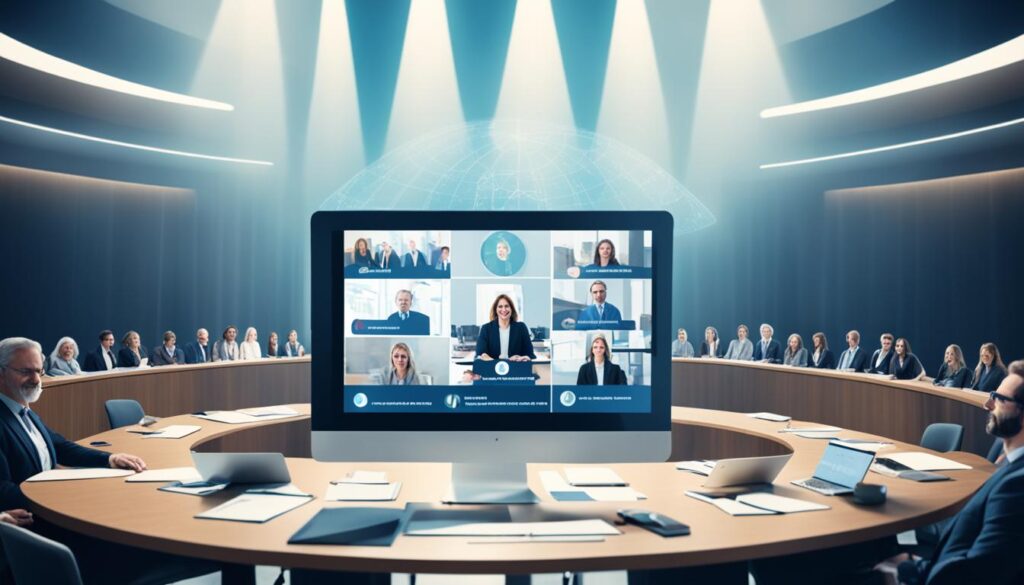
Technology can solve the justice access crisis with innovative solutions. Legal tech helps people get legal services, make lawful documents, and engage in efficient proceedings. By using tech, we can make the legal system accessible to everyone.
The Future of Virtual Legal Services and Online Dispute Resolution
Virtual legal services and online dispute resolution are changing the legal world. They show what the future of easy-to-get legal help looks like. Thanks to digital advancements, anyone can access legal services from anywhere.
These services make it easier and faster to get legal help. They use technology to reach more people. Now, you don’t need to be in the same place as your lawyer to get advice.
With these digital tools, you can get legal advice from your home. This saves time and money. It also makes legal help available for everyone.